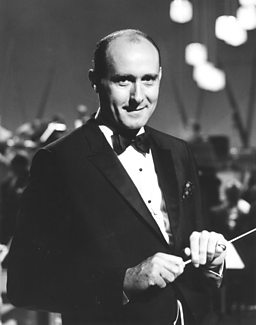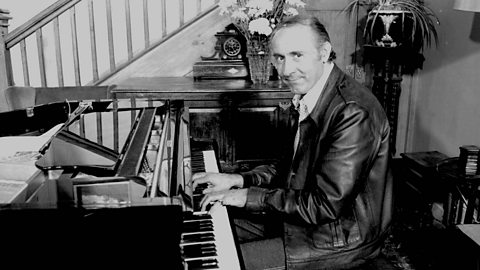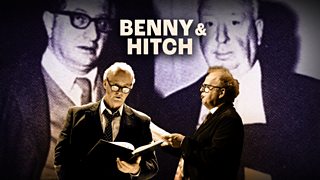Moon River: The story of the 1962 Oscars Best Song winner
"Wherever you're going, I'm going your way..."
One of the greatest film music composers of all time, Henry Mancini, declared that "...melody is the soul of communication with people. As far as entertainment goes..." Mancini was born 100 years ago this year. For Sound of Cinema Sunday, Radio 3's Between the Ears dives into the life and work of the man who wrote Moon River – the unmistakable and Oscar-winning theme to Breakfast at Tiffany’s, which starred Audrey Hepburn.
The programme tells Henry Mancini's story from his early life as the son of Italian immigrants in Pittsburgh where he was first handed a flute by his father, through his years as a musician in the big bands, learning the film trade at Universal Pictures, and eventually to composing some of the most recognisable music on film.

From Oppenheimer to Breakfast at Tiffany’s, Sound of Cinema Sunday brings the best film music to Radio 3 just in time for the 2024 Academy Awards. The special day of programming on Sunday 10 March celebrates over a hundred years of music for film with the help of composers like Oscar-winner Hans Zimmer (Dune), Isobel Waller-Bridge (Wicked Little Letters), Ludwig Goransson (Oppenheimer) and Jerskin Fendrix (Poor Things).
Dive into the life and work of Henry Mancini, the composer of Moon River; that unmistakable and Oscar-winning theme to Breakfast at Tiffany’s.
An orchestra behind the screen
Henry Mancini was born in Cleveland, Ohio and raised in a steel town near Pittsburgh, Pennsylvania by Italian immigrant parents. The first time Mancini saw a movie where he noticed the music, he thought there was an orchestra behind the screen. Mancini was given a flute by his father and went on to study music at America’s esteemed Juilliard school. By the time Mancini was composing for Universal Pictures in the 1950s, he had played in the Big Band era of the 1940s and had a first-hand knowledge of jazz.
Breakfast at Tiffany’s
After writing the jazz-infused score for the 1950s crime series Peter Gunn (which happened to feature composer John Williams on piano), Mancini was asked to score a new movie by director Blake Edwards.
In the script for Breakfast at Tiffany's, there was a scene where Audrey Hepburn’s character leans out of the window and sings a song from her past. Mancini had heard Hepburn sing in the movie Funny Face, so he specifically wrote a song in her range and asked Johnny Mercer to write some words that would hint at Holly Golightly’s mysterious past.
“The first time I read that lyric, it scanned so beautifully. And when I got to 'huckleberry friend', there was no question in my mind [that it was] a new word in the English language or a new phrase, let's put it that way,” Mancini explained. Those three opening notes to Moon River score one of the most memorable scenes in movie history. Mancini said he spent a month tinkering with the melody, but when it finally came to him, it took just half an hour to write the music.
Audrey Hepburn wrote to Mancini:
Dear Henry
I have just seen our picture – BREAKFAST AT TIFFANY’S – this time with your score.
A movie without music is a little bit like an aeroplane without fuel. However beautifully the job is done, we are still on the ground and in a world of reality. Your music has lifted us all up and sent us soaring. Everything we cannot say with words or show with action you have expressed for us. You have done this with so much imagination, fun and beauty.
You are the hippest of cats – and the most sensitive of composers!
Thank you, dear Hank.
Lots of love
Audrey
When it was time for the studio to preview the movie, everybody was ecstatic. Audrey was there with Mancini and the head of the studio. Standing by the fireplace, the studio head said, “The picture’s great, but the goddamn song has to go!” That's when Audrey famously stood up and said “Over my dead body!”

Mancini and the Oscars
At the 34th Academy Awards ceremony in 1962, Moon River won two Oscars: Best Music (Score of a dramatic or comedy picture), and Best Music (Song). “I’m deeply grateful to the Members of the Academy...” Mancini said from the podium, “...as well as my good friend Blake Edwards.”
A year later, Mancini would go on to win a third Oscar for his score to Days Of Wine And Roses, and a fourth in 1982 for Victor/Victoria.

"Over my dead body!"
Audrey Hepburn wasn't impressed when the studio head said Moon River had to go...
Discover more about Henry Mancini’s life and work, through 麻豆社 archive interviews with Mancini and those who knew him, in Between the Ears: Henry Mancini.
Highlights of Sound of Cinema Sunday
-
![]()
Private Passions
Michael Berkeley鈥檚 guest is the film-maker, producer and writer Mark Cousins. His documentary work includes The Story of Film, an epic 900-minute journey through the history of cinema.
-
![]()
Jazz Record Requests
Alyn Shipton presents your requests for jazz in film, with music from Louis Armstrong, Miles Davis and Laura Karpman.
-
![]()
Words and Music
With the Academy Awards given out today, the literary sequence turns to the movies alongside the sounds of Erich Korngold and Max Steiner, John Williams, John Adams and Poulenc. Readers: Robert Powell and Amanda Donohoe.
-
![]()
Benny & Hitch
The explosive relationship between composer Bernard Herrmann and Alfred Hitchcock brought to life by Andrew McCaldon with the 麻豆社 Concert Orchestra, starring Tim McInnerny and Toby Jones.




